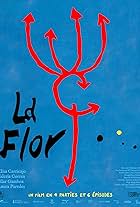
Laura Paredes in Trenque Lauquen.Fittingly for a film tracking a botanist along her quest for an ultra-rare flower, Laura Citarella’s Trenque Lauquen unfurls like the network of a rose, each of its myriad tales unveiling and spilling into the next. Stretched across 250 minutes, split into twelve chapters, and divided into two parts, the film is a maze of forking paths, the cinematic equivalent of a short story by Jorge Luis Borges, who hovers above it as an essential touchstone. This is, after all, a Pampero Cine production, the Buenos Aires collective that spawned Mariano Llinás’s 2018 epic La Flor, another sprawling multi-genre pastiche that looked to the rhizomatic writings by Borges and other Río de la Plata scribes for inspiration. Back in 1969, together with director Hugo Santiago and fellow writer Adolfo Bioy Casares, Borges co-wrote Invasión, a portrait of a fictional city, Aquileia, under an endless siege. Modeled on Buenos Aires,...
- 10/10/2022
- MUBI
A career woman is haunted by a teenager she could have saved from death in this masterful political thriller from Argentina
Guilt and the return of the repressed are behind this elegant, disquieting and impressively acted political ghost story from Argentinian film-maker Francisco Márquez. Cecilia (Elisa Carricajo) is a sociology professor and single mother of a little boy, Juan (Ciro Coien Pardo); she is very successful, though on edge about her recent application for an academic promotion. Cecilia gets on well with her maid Nebe (Mecha Martinez) but is made very uncomfortable when Nebe brings round her teenage son Kevin (Eliot Otazo). Kevin seems dour, unsmiling, perhaps with learning difficulties.
In the middle of a stormy night, Cecilia is awoken by a terrifying banging at the door, preceded by an eerie dreamlike voice murmuring “Cecilia” in her ear. Peering through the shutters, she can see it is Kevin and is too scared to open up.
Guilt and the return of the repressed are behind this elegant, disquieting and impressively acted political ghost story from Argentinian film-maker Francisco Márquez. Cecilia (Elisa Carricajo) is a sociology professor and single mother of a little boy, Juan (Ciro Coien Pardo); she is very successful, though on edge about her recent application for an academic promotion. Cecilia gets on well with her maid Nebe (Mecha Martinez) but is made very uncomfortable when Nebe brings round her teenage son Kevin (Eliot Otazo). Kevin seems dour, unsmiling, perhaps with learning difficulties.
In the middle of a stormy night, Cecilia is awoken by a terrifying banging at the door, preceded by an eerie dreamlike voice murmuring “Cecilia” in her ear. Peering through the shutters, she can see it is Kevin and is too scared to open up.
- 4/6/2021
- by Peter Bradshaw
- The Guardian - Film News

Francisco Márquez’s feature premiered at the Berlinale in 2020.
Sovereign Film Distribution has acquird UK and Ireland rights to Francisco Márquez’s Argentinian thriller A Common Crime from Dubai-based Cercamon.
The film premiered in the Panorama at the Berlinale in 2020 and screened at the BFI London Film Festival later in the year.
Sovereign is aiming for a day-and-date release on April 9 if cinemas are open. The distributor is also making the title available for virtual cinema release and is closing agreements with several sites.
The story centres on a teacher, played by played by Elisa Carricajo, who is disturbed one...
Sovereign Film Distribution has acquird UK and Ireland rights to Francisco Márquez’s Argentinian thriller A Common Crime from Dubai-based Cercamon.
The film premiered in the Panorama at the Berlinale in 2020 and screened at the BFI London Film Festival later in the year.
Sovereign is aiming for a day-and-date release on April 9 if cinemas are open. The distributor is also making the title available for virtual cinema release and is closing agreements with several sites.
The story centres on a teacher, played by played by Elisa Carricajo, who is disturbed one...
- 2/11/2021
- by Michael Rosser
- ScreenDaily

Mariano Llinás' La Flor is showing July and August on Mubi in the United States.1.In the Argentinian film La Flor (2018), a certain kind of sight and a certain kind of sound predominate—spread right across its roughly thirteen-and-a-half hours and six major parts.First, the sight. There are various directors in cinema history known for their stubborn insistence on using a particular camera lens which becomes their veritable stylistic signature: for example, the 25-millimeter lens for deep focus effect in Jacques Rivette; or the split diopter in Brian De Palma. Mariano Llinás takes the exactly opposite position in La Flor: his lens-weapon of choice is a defiantly shallow one, plunging great expanses of any frame into blur. Sometimes there’s a relatively traditional bit of focus-pulling back and forth between two points in a scene. Far more often, it’s a mise en scène based on characters slowly...
- 7/17/2020
- MUBI


Competition
“All the Dead Ones”
Caetano Godardo, Marco Dutra
Following up on their Locarno-prized “Good Manners,” genre auteur Dutra and Gotardo deliver a lushly turned-out family drama that converts ghostliness into political metaphor, conflating 1899 Sao Paulo with its high-rise present, asking if the uneasy relationship between Brazil’s white elite and black majority has essentially changed.
Sales: Indie Sales
Encounters
“Los Conductos”
Camilo Restrepo
Pinky, on the run from a sect, takes to squatting, making T-shirts for a living, taking drugs and spinning images of the Apocalypse, damnation, revenge. A spectral, crazed allegory of Colombian post-civil conflict reinsertion that won Mar del Plata’s 2019 Works in Progress.
Sales: Best Friend Forever
Panorama
“A Common Crime”
Francisco Márquez
Set in class-riven Argentina and packing, reportedly, a great finale and commanding performance from lead Elisa Carricajo as an Argentine university teacher who fails to help her maid’s son, with literally haunting consequences.
“All the Dead Ones”
Caetano Godardo, Marco Dutra
Following up on their Locarno-prized “Good Manners,” genre auteur Dutra and Gotardo deliver a lushly turned-out family drama that converts ghostliness into political metaphor, conflating 1899 Sao Paulo with its high-rise present, asking if the uneasy relationship between Brazil’s white elite and black majority has essentially changed.
Sales: Indie Sales
Encounters
“Los Conductos”
Camilo Restrepo
Pinky, on the run from a sect, takes to squatting, making T-shirts for a living, taking drugs and spinning images of the Apocalypse, damnation, revenge. A spectral, crazed allegory of Colombian post-civil conflict reinsertion that won Mar del Plata’s 2019 Works in Progress.
Sales: Best Friend Forever
Panorama
“A Common Crime”
Francisco Márquez
Set in class-riven Argentina and packing, reportedly, a great finale and commanding performance from lead Elisa Carricajo as an Argentine university teacher who fails to help her maid’s son, with literally haunting consequences.
- 2/21/2020
- by John Hopewell and Jamie Lang
- Variety Film + TV


An Argentinean born filmmaker who saw his La larga noche de Francisco Sanctis selected for the Un Certain Regard section at 2016 Cannes Film Festival resurfaces at the Berlinale’s Panorama section with Un crimen común / A Common Crime. Francisco Márquez‘s latest psychologically digs in the mindset of a sociology teacher named Cecilia (Elisa Carricajo from La Flor fame) who is haunted by the ghost of a young man. We have your first look at the trailer and poster one sheet.
…...
…...
- 2/13/2020
- by Eric Lavallée
- IONCINEMA.com
Save for the below three texts, written daily and without distance, my thoughts on Mariano Llinás’s La flor are now mostly lost and long gone. Premiered in three parts across three days at the tail-end of the 2018 Locarno Film Festival, this 14-hour film full of endless dead ends remains more memorable for the unique conditions of its viewing than for its many plots. In spite of instructive interludes scattered throughout—Llinás does announce each episode’s excluded beginning, middle, or end, an admonition that promises no unity other than the reliable reappearance and reinvention of its four star performers—any spectator would have every reason to doubt Llinas’s reliability as narrator, inclined instead to approach with caution and see for themselves. And so, with a unique opportunity to embrace uncertainty and be suspended in self-doubt, blindly writing on La flor became as pleasurable as watching La flor. Free...
- 8/26/2019
- MUBI


A decade in the making, Mariano Llinás’ “La Flor” opens this weekend from Grasshopper Film. Clocking in at over 13 hours across six “episodes,” “La Flor” brings a whole new meaning to the concept of binge-watching. Each episode stars Elisa Carricajo, Valeria Correa, Pilar Gamboa, and Laura Paredes. It’s an epic of subplots within subplots, unexpected digressions, and genres on top of genres — from a B-movie to a musical to a spy thriller, a period piece, a remake of a French classic, and, finally, to something altogether metafictional.
Grasshopper promises a “wildly entertaining… adventure in scale and duration” — and quite possibly in patience as well. “La Flor” earns its place among history’s very long movies, from Raúl Ruiz’s “Mysteries of Lisbon,” Jacques Rivette’s “Out 1” and Bela Tarr’s “Sátántangó” to pretty much anything directed by Lav Diaz, the modern master of slow cinema.
Originally, “La Flor...
Grasshopper promises a “wildly entertaining… adventure in scale and duration” — and quite possibly in patience as well. “La Flor” earns its place among history’s very long movies, from Raúl Ruiz’s “Mysteries of Lisbon,” Jacques Rivette’s “Out 1” and Bela Tarr’s “Sátántangó” to pretty much anything directed by Lav Diaz, the modern master of slow cinema.
Originally, “La Flor...
- 8/2/2019
- by Ryan Lattanzio
- Indiewire


The first thing to know about “La Flor” is that it’s 14 hours and 28 minutes long. The second is that it more than justifies that intimidating runtime, which is divided into six episodes.
Each discrete story unfolds according to the dictates of a different genre, which is to say that Argentine filmmaker Mariano Llinás’ unique achievement is a B-movie, a musical mystery, a spy thriller, a self-reflexive metafiction, a black-and-white riff on Renoir’s “A Day in the Country,” and a vague dramatization of an 18th-century Englishwoman’s account of being abducted by Native Americans — all at once. The same quartet of actresses star in all but one episode, lending the affair much-needed continuity.
Llinás himself opens the film to introduce his ambitious project, mapping out the structure on a sheet of paper in a way that explains the title: Four of the stories have a beginning but no end; the fifth,...
Each discrete story unfolds according to the dictates of a different genre, which is to say that Argentine filmmaker Mariano Llinás’ unique achievement is a B-movie, a musical mystery, a spy thriller, a self-reflexive metafiction, a black-and-white riff on Renoir’s “A Day in the Country,” and a vague dramatization of an 18th-century Englishwoman’s account of being abducted by Native Americans — all at once. The same quartet of actresses star in all but one episode, lending the affair much-needed continuity.
Llinás himself opens the film to introduce his ambitious project, mapping out the structure on a sheet of paper in a way that explains the title: Four of the stories have a beginning but no end; the fifth,...
- 7/31/2019
- by Michael Nordine
- The Wrap
"An astonishment." Grasshopper Film has unveiled an official trailer for an intriguing cinema project titled La Flor, made by Argentinian filmmaker Mariano Llinás. A decade in the making, La Flor is a 14-hour long film that is being shown in four parts. La Flor "robs" the cinema in six episodes. Each episode corresponds to a cinematographic genre. The first is a "B-series", as the Americans used to do. The second is a musical melodrama with a hint of mystery. The third is a spy movie. The fourth is an abyss of cinema. The fifth revisits an old French film. The sixth speaks of captive women in the 19th century. These six episodes, these six genres have one thing in common: their four actresses. Starring Elisa Carricajo, Valeria Correa, Pilar Gamboa, and Laura Paredes. This is really only for die-hard cinema nerds who feel the need to sit through it, because...
- 7/26/2019
- by Alex Billington
- firstshowing.net
Joining the rarified pantheon of expansive cinematic storytelling occupied by the likes of Rainer Werner Fassbinder’s Berlin Alexanderplatz, Jacques Rivette’s Out 1, Claude Lanzmann’s Shoah, Wang Bing’s West of the Tracks, and any number of Lav Diaz films comes Mariano Llinás’ 14-hour epic La Flor. Following a festival tour including Locarno, New York, and Toronto, Grasshopper Film will now unleash the cinematic event of the year starting next week in New York City and we’re pleased to premiere the trailer.
A decade in the making and shot across three continents, the film stars Elisa Carricajo, Valeria Correa, Pilar Gamboa, and Laura Paredes across six episodes, each bringing a different genre to the table, from a bonkers B-movie about mummies to a musical to a spy thriller to a Renoir remake and beyond. Llinás, who burst onto the international filmmaking scene with 2008’s four-hour Extraordinary Stories,...
A decade in the making and shot across three continents, the film stars Elisa Carricajo, Valeria Correa, Pilar Gamboa, and Laura Paredes across six episodes, each bringing a different genre to the table, from a bonkers B-movie about mummies to a musical to a spy thriller to a Renoir remake and beyond. Llinás, who burst onto the international filmmaking scene with 2008’s four-hour Extraordinary Stories,...
- 7/25/2019
- by Leonard Pearce
- The Film Stage


In today’s film news roundup, Michael B. Jordan’s “The Silver Bear” finds a director, biopic “Running for My Life” is in the works, Fox is using new trailer compliance software and the 14-hour “La Flor” gets distribution.
Director Attachment
Gerard McMurray, director of “The First Purge,” will write and direct Michael B. Jordan’s thriller “The Silver Bear” from Lionsgate, Nickel City Pictures and Jordan’s Outlier Society.
McMurray was a producer on Jordan’s 2013 breakout drama “Fruitvale Station.” Jordan became attached to the “The Silver Bear” in October.
“The Silver Bear” is based on the book series by Derek Haas, the screenwriter for “Wanted” and “3:10 to Yuma.” The novel centers on an assassin named Columbus — called the Silver Bear by some — who tracks a powerful politician with presidential aspirations.
Project Launch
Film Roman Productions, best known for producing “The Simpsons,” is starting production of its first non-animated feature film,...
Director Attachment
Gerard McMurray, director of “The First Purge,” will write and direct Michael B. Jordan’s thriller “The Silver Bear” from Lionsgate, Nickel City Pictures and Jordan’s Outlier Society.
McMurray was a producer on Jordan’s 2013 breakout drama “Fruitvale Station.” Jordan became attached to the “The Silver Bear” in October.
“The Silver Bear” is based on the book series by Derek Haas, the screenwriter for “Wanted” and “3:10 to Yuma.” The novel centers on an assassin named Columbus — called the Silver Bear by some — who tracks a powerful politician with presidential aspirations.
Project Launch
Film Roman Productions, best known for producing “The Simpsons,” is starting production of its first non-animated feature film,...
- 2/21/2019
- by Dave McNary
- Variety Film + TV
Mariano Llinas’ 14-hour prize-winner will get a theatrical run this summer.
Grasshopper Film has acquired Us distribution rights to La Flor, Argentinian director Mariano Llinas’ 14-hour feature that premiered at the Locarno festival and came out a prize-winner at this month’s Rotterdam festival.
Grasshopper plans to open the film theatrically in New York and around the Us this summer, with a release on digital platforms to follow.
A decade in the making, La Flor follows four actresses - Elisa Carricajo, Valeria Correa, Pilar Gamboa, and Laura Paredes - through six episodes, including a monster movie, a musical, a spy...
Grasshopper Film has acquired Us distribution rights to La Flor, Argentinian director Mariano Llinas’ 14-hour feature that premiered at the Locarno festival and came out a prize-winner at this month’s Rotterdam festival.
Grasshopper plans to open the film theatrically in New York and around the Us this summer, with a release on digital platforms to follow.
A decade in the making, La Flor follows four actresses - Elisa Carricajo, Valeria Correa, Pilar Gamboa, and Laura Paredes - through six episodes, including a monster movie, a musical, a spy...
- 2/20/2019
- by John Hazelton
- ScreenDaily
Tucked deep into Mariano Llinás’ monumental 14-hour, 3-part, 6-episode epic La Flor is a montage that only spans a few minutes. Introducing the film’s third and final part atop the stage of Locarno’s L’Altra Sala a few hours prior, Llinás had warned the segment would predate the screening’s second interlude – the announcement part of a habitual routine where the Argentinian would stand before the crowd to remind everyone when to brace for the short-lived bathroom breaks. “There’ll be a second chance, right after a beautiful scene with las cuatros chicas, the four girls.”
The four girls are the terrific members of Piel de Lava, an acting quartet comprising of Elisa Carricajo, Valeria Correa, Pilar Gamboa, and Laura Paredes. They are the only link between the six episodes structuring La Flor – six tales which, as Llinás himself spells out during the film’s preamble, one in several metafictional ruptures,...
The four girls are the terrific members of Piel de Lava, an acting quartet comprising of Elisa Carricajo, Valeria Correa, Pilar Gamboa, and Laura Paredes. They are the only link between the six episodes structuring La Flor – six tales which, as Llinás himself spells out during the film’s preamble, one in several metafictional ruptures,...
- 8/29/2018
- by Leonardo Goi
- The Film Stage


The following essay was produced as part of the 2018 Locarno Critics Academy, a workshop for aspiring film critics that took place during the Locarno Film Festival.
In a present that is increasingly difficult to comprehend, directing one’s gaze towards the past is not only comforting — it also helps contextualize the present moment. This year’s edition of the Locarno Film Festival certainly had that effect, as many of its films — ranging from the mammoth projections in Piazza Grande (with titles ranging from Lino Brocka’s “Manila in the Claws of Light” and Spike Lee’s “BlackKklansman”) to the films included across its myriad sections — were visibly driven by the desire to showcase history.
Locarno is both an outlet for cutting-edge films that showcase the most recent developments across the global independent film industry, and a space that honors masterpieces of the past. An entire section of the festival — the...
In a present that is increasingly difficult to comprehend, directing one’s gaze towards the past is not only comforting — it also helps contextualize the present moment. This year’s edition of the Locarno Film Festival certainly had that effect, as many of its films — ranging from the mammoth projections in Piazza Grande (with titles ranging from Lino Brocka’s “Manila in the Claws of Light” and Spike Lee’s “BlackKklansman”) to the films included across its myriad sections — were visibly driven by the desire to showcase history.
Locarno is both an outlet for cutting-edge films that showcase the most recent developments across the global independent film industry, and a space that honors masterpieces of the past. An entire section of the festival — the...
- 8/25/2018
- by Flavia Dima
- Indiewire
Where to begin? Described by the 71st edition’s artistic director Carlo Chatrian as “a new way to watch films,” Argentine director Mariano Llinás’s latest has been touted as the longest film in the history of the great Locarno Festival. Running an exceptional 14 hours, the first 206 minutes of Llinás’s episodic epic—to be more specific, six stories told in three parts—proved a promising pulp anomaly. So far, so good. La Flor, a celebratory showcase that, in spite of its daunting duration, is not yet ever uneventful, is in no sense slow or contemplative cinema: a form that, by design, might produce the kind of fatigue necessary to find whatever epiphany lies beyond our boredom.Though its many plots seem to extend into perpetuity, La Flor, variously abbreviated and abridged, instead flourishes with an abandon, following no rules other than its own. Llinás’s prologue begins with two images,...
- 8/10/2018
- MUBI
Cult filmmaker and scriptwriter Mariano Llinas' epic 14 hour-long film La Flor (The Flower) topped the 20th edition of the Buenos Aires International Independent Film Festival, which began on April 11 and ends Sunday. The film also won the best actress award for its four leads Pilar Gamboa, Valeria Correa, Elisa Carricajo and Laura Paredes.
A record-breaking, 840-minutes film – the longest fiction feature in Argentine history – La flor consists of six different episodes, all starring the same four actresses, who form the acting company Piel de Lava ("Lava Skin"). Shot independently throughout a nine-year period across three continents,...
A record-breaking, 840-minutes film – the longest fiction feature in Argentine history – La flor consists of six different episodes, all starring the same four actresses, who form the acting company Piel de Lava ("Lava Skin"). Shot independently throughout a nine-year period across three continents,...
- 4/21/2018
- by Agustin Mango
- The Hollywood Reporter - Movie News
Cult filmmaker and scriptwriter Mariano Llinas' epic 14-hour-long film <em>La Flor </em>(<em>The Flower</em>) topped the 20th edition of the Buenos Aires International Independent Film Festival, which began April 11 and ends Sunday. The film also won the best actress award for its four leads, Pilar Gamboa, Valeria Correa, Elisa Carricajo and Laura Paredes.
The longest fiction feature in Argentine history, <em>La flor </em>consists of six different episodes, all starring the same four actresses, who form the acting company Piel de Lava ("Lava Skin"). Shot independently over a nine-year period across three continents and split into three parts for ...
The longest fiction feature in Argentine history, <em>La flor </em>consists of six different episodes, all starring the same four actresses, who form the acting company Piel de Lava ("Lava Skin"). Shot independently over a nine-year period across three continents and split into three parts for ...
- 4/21/2018
- The Hollywood Reporter - Film + TV
Check out the trailer and browse the images below for Cinema Guild's Viola. The drama opens July 12 in New York City and stars María Villar, Agustina Muñoz and Elisa Carricajo. Directed by Matías Piñeiro, one of Argentinian cinema’s most sensuous and daring new voices, Viola is a mystery of romantic entanglements and intrigues among a troupe of young actors performing Shakespeare’s “Twelfth Night” in a small theater in Buenos Aires. Viola is produced by Melanie Schapiro.
- 6/13/2013
- Upcoming-Movies.com
IMDb.com, Inc. takes no responsibility for the content or accuracy of the above news articles, Tweets, or blog posts. This content is published for the entertainment of our users only. The news articles, Tweets, and blog posts do not represent IMDb's opinions nor can we guarantee that the reporting therein is completely factual. Please visit the source responsible for the item in question to report any concerns you may have regarding content or accuracy.